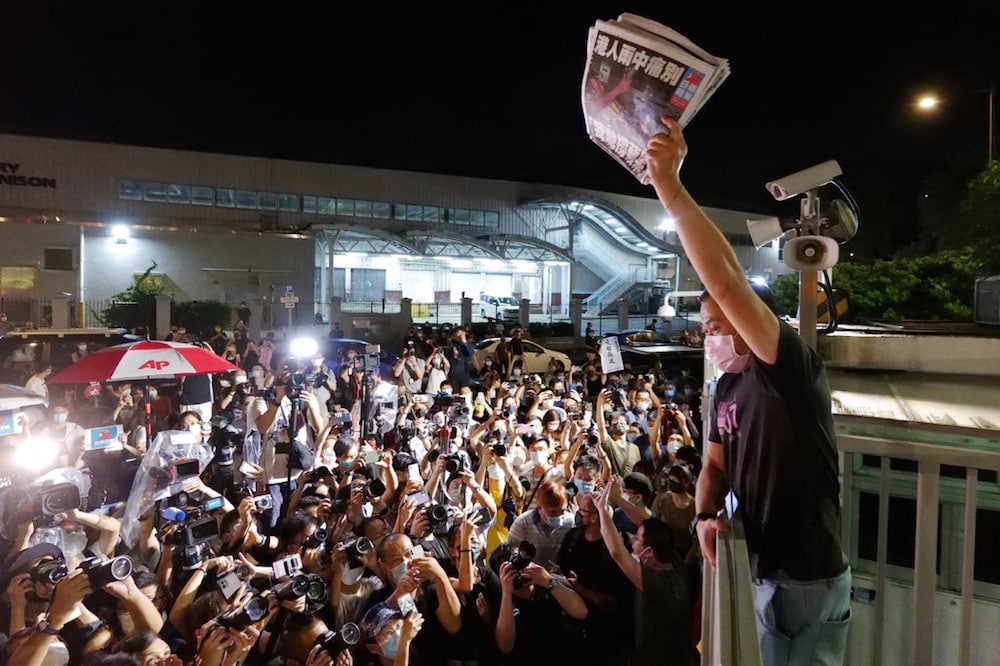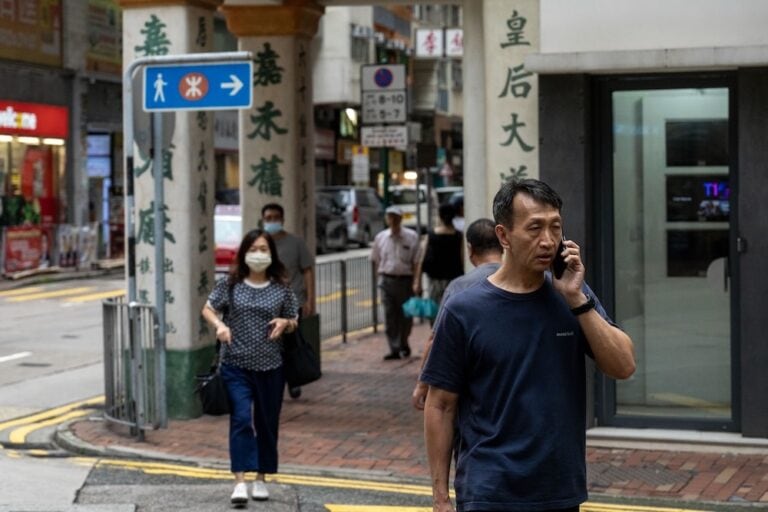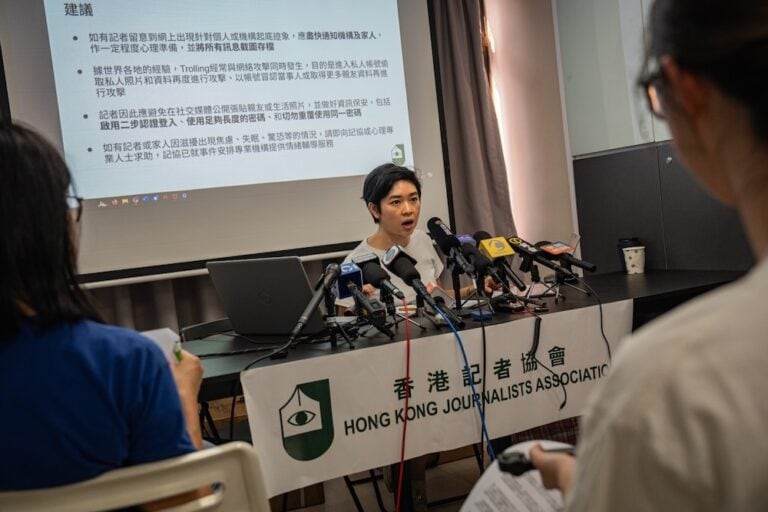The annual report of the Hong Kong Journalists Association highlighted the deterioration of media freedom in Hong Kong after the passage of the National Security Law.
This statement was originally published on hkja.org.hk on 15 July 2021.
The Hong Kong Journalists Association releases the Association’s 2021 Annual Report, entitled Freedom in Tatters today (15 July 2021). Chris Yeung, the chief editor of the report, found that the Hong Kong press industry faced increasing threats in the past 12 months. Suppression from the authorities is felt across different forms of media; freedoms have seriously deteriorated under a repressive government.
The report analyses and documents events in the past 12 months that saw political ‘red lines’ being laid across the city in the name of the National Security Law: The arrest of the Next Digital founder Jimmy Lai; numerous restrictions on the press introduced by Chief Executive Carrie Lam, such as the “fake news” legislation that’s in the pipeline, revamping RTHK, tightening the data search of public registers and redefining journalists unilaterally. All of the above led to an unprecedented shock to journalists. They also narrowed the space for free press and created higher risks for press workers. Also, these events aggravated self-censorship and threatened the public’s right to know.
At the time of printing of this report, Apple Daily’s bank accounts were frozen in relation to the arrests of Next Digital’s top executives. They were arrested for allegedly breaching the national security law, leading to the cessation of its newspaper’s operation.
HKJA is not only concerned about the unemployment of hundreds of media workers caused by the closure of this media outlet, but also the erosion of freedom and the damage done to the diversified media scene. The roundup of media professionals is also damaging for the city’s international reputation, especially when Hong Kong takes pride in its free flow of information and free exchange of ideas.
HKJA makes the following appeals in this year’s Annual Report:
1. The Chinese National People’s Congress should review the implementation of the NSL taking into account the change of circumstances and the anxieties of Hong Kong people. The NPC should study amendments and supplementary provisions, in particular making public interest as a defence for journalists. That will safeguard press freedom.
2. The Government should allow media access to public data as they had been before. Doing so will help journalists get information for reporting activities and thus be able to play their role of monitoring in society.
3. The Government should shelve studies on legislation on misinformation. To beat misinformation, the Government should do so by other means including education and publicity, which could help enhance public understanding about misinformation for them to exercise self-monitoring.
4. Police should revoke the amendment of the definition of “media representatives” in the Police General Orders and genuinely facilitate the reporting of journalists.
5. The Government should speed up the enactment of an archives law and a freedom of information law that are effective in enhancing public access to information and archives.
6. The Government should stop putting pressure on RTHK and respect its editorial autonomy.
Contents of the report are:
Chapter 1: Chris Yeung documents the shrinking freedom of the press under the National Security Law. Political ‘red lines’ are drawn, while the law is being weaponized, the proposed ‘Fake News Law’ offered another sharp knife to the Government, famed writers and broadcasters bore the brunt, and foreign press are making plans to retreat from Hong Kong. The Press Freedom Index therefore plummeted to an all-time low.
Chapter 2: Charles Tang points out the difficulties faced by journalists to commit public registry searches. The conviction of Bao Choy over public registry searches shocked the press industry, yet the impact of the restrictions had already emerged since 2019. The Immigrations Department, Transport Department, Companies Registry, Buildings Department and Registration and Electoral Office prohibited the public and the press to check public registry through amendment. By changing the law, the authorities have made it much harder for journalists to perform registry searches, hence constraining the plausibility of investigative reports.
Chapter 3: Both the Government and HKPF singled out ‘fake journalists’ amid the huge number of journalists in the 2019 anti-amendment protest, citing that it made law enforcement much more difficult. May 2020 saw HKPF unilaterally amended the definition of ‘press representatives’ in the ‘Police General Orders’ (PGO), placing limits on freelance reporters, school media reports and citizen journalists. Pro-Beijing groups then took over the baton and advocated for a press accreditation system, indicating that the Central Government would like the SAR Government to make proposals to regulate journalists.
Chapter 4: Au Ka-Lun analyses the Government’s revamp on RTHK in the past year. Programmes such as ‘Headliner’, ‘Pentaprism’ and ‘Police Report’; Personnel such as Bao Choy, Nabela Qoser and Yvonne Tong, all disappeared from the RTHK roster. Since the new Director of Broadcasting took office this year, transparency and editorial independence have been tossed out of the window.
Under the impact of the central authorities’ “overall jurisdiction” over Hong Kong, the public broadcaster fails to retain its role as an independent watchdog. Instead, it’s been turned into a government propaganda apparatus. The changes in RTHK showcase the fragility of the city’s public broadcasting service.
Chapter 5: Lam Miu-Yan recaps memories before and after the ‘mass registration day’ in December 2020 at Cable News, including the attitude of the executives at ‘New Cable’ and the argument on that fateful day. Aside from that, the work of ‘Happy News Department’ was also reviewed, including the careful investigation and verification of feature news. The team continues to brainstorm for unique ways to demonstrate important issues, and to maintain neutrality amid growing societal diversion.
Chapter 6: Rose LW Luqiu analyses the media as a tool to maintain social stability. In the early stage of the coronavirus outbreak, different news media voiced their own opinion, yet the instructions and demands from the Central Government unified the media tones in mid-February 2020. The authorities shunned criticisms and shifted attention towards China’s successful stories of combating the pandemic.
Following the Reform and Opening-Up, some believed that news supervision by public opinion will flourish under the marketization of news outlets, providing fuel for China democratization. However, in protection of the weakened political legitimacy and stepping up control over Western influence, more regulations are placed upon news outlets. The authorities are also becoming more careful with international broadcasting, meaning that there is no sign whatsoever of loosening media controls.
The annual report can be downloaded at www.hkja.org.hk or by clicking here. If you want to have more information on the report, please contact the HKJA on 2591 0692 or email hkja@hkja.org.hk.
Hong Kong Journalists Association
15 July 2021



